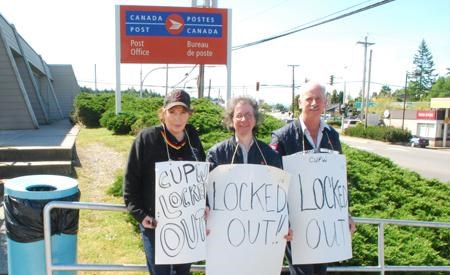Updated Wednesday, June 22: In a move to end the Canada Post lockout, the federal government tabled back-to-work legislation on Monday, June 20. Labour Minister Lisa Raitt introduced the bill in the House of Commons after daily question period.
Following an unproductive weekend, which failed to make any progress toward ending the labour dispute, representatives of Canada Post and the Canadian Union of Postal Workers (CUPW) started talking the same day the legislation was tabled.
Before Canada Post locked them out on June 15, postal workers had been staging rotating strikes across the country beginning on June 3.
If legislation is passed before Canada Post and the union make a deal, employees would return to work and an arbitrator would have 90 days to study proposals made by both sides before coming up with a final settlement.
Canada Post has said the main issue is the union’s demand for staffing levels beyond its capability. The union has been emphasizing working conditions and safety issues, as well as arguing that new employees would receive inferior wages and pensions.
Roy Mabbett, CUPW Local 808 shop steward, said that in the past, letter carriers were discouraged from sorting mail while walking their route. With the installation of new sorting machines in postal outlets, letters and admail are being bundled differently and Mabbett said that additional sorting must now be done manually on the route, prior to each delivery.
“You’re handling [letters] and unaddressed admail at the same time,” he said. “The injury rate has skyrocketed in Winnipeg and Hamilton where they’re testing it, and they’ve rolled this out and it’s coming everywhere.”
In addition to safety, pay cuts are a major issue for the union.
“They made a record profit in their last fiscal year of $281 million; they’ve made profits for 16 years in a row,” said Mabbett.
Canada Post has proposed a new two-tier wage system for new hires. At the present time, new workers start at a rate just under $2 below the top hourly wage and increase to the full rate of pay within two years. The proposed starting wage would decrease to $7 below the top hourly wage and take seven years to reach the same rate of pay. The union is dissatisfied with this proposition, which has become a major roadblock in negotiations. “We believe in equal pay for equal work,” Mabbett said.
“It’s not like that’s a losing proposition for them,” added letter carrier Jim Devine. “The company’s made profits.”
Canada Post claims to have a $3.2-billion pension deficit, and in a written statement, the company said the reason for adjusting its offerings to future employees was “to protect what current employees have.” The new offerings for future employees would include “a starting wage of $19 an hour that rises to the same $26 an hour maximum as existing employees over seven years, up to six weeks’ vacation, and a fully indexed defined benefit pension by age 60.”
All post offices staffed by CUPW members currently remain closed and no mail is being delivered.



